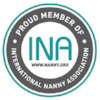As a live-in nanny, you have the unique opportunity to become an integral part of a family's daily life. This arrangement can be incredibly rewarding, but it also requires a careful balance of personal and professional boundaries. Just like in any workplace, maintaining professionalism is crucial for a healthy and successful working relationship. Here are some best practices to help you navigate this unique dynamic.
Establish Clear Boundaries
Define Work Hours: Clearly agree on your working hours and ensure both parties respect these times. This helps prevent burnout and ensures you have personal time to recharge.
Designate Personal Space: Identify areas in the home that are exclusively for your use. This might be your bedroom or a separate living area where you can have privacy and downtime.
Communication is Key
Regular Check-ins: Schedule regular meetings with the parents to discuss any concerns, updates, or changes in routines. This helps keep everyone on the same page and addresses issues before they escalate.
Open Dialogue: Foster an environment where both you and the parents feel comfortable discussing any problems or misunderstandings. Transparency is vital for trust and respect.
Maintain Professionalism
Dress Appropriately: Even though you are in a home setting, dressing in a professional and appropriate manner helps reinforce your role as a professional caregiver.
Examples: Casual business attire, such as polo shirts, blouses, and khakis, is usually appropriate. Avoid overly casual clothing like ripped jeans, short shorts, or low-cut tops.
Comfortable and Practical: Choose clothes that are comfortable for active work with children but still presentable. For instance, neat t-shirts paired with well-fitted jeans or leggings can work well.
Use Professional Language: Communicate respectfully and professionally at all times. Avoid using slang or overly casual language, especially in front of the children.
Respect Family Privacy
Confidentiality: Respect the privacy of the family’s personal lives. Do not share personal information about the family with others without their explicit permission.
Limit Personal Visitors: Discuss and agree on policies regarding having personal visitors at the home. Respect the family’s preferences and ensure your visitors do not disrupt the household.
Please be mindful to treat your host's home like your office. Even though you may feel at home, it's important to maintain professional boundaries. This means dressing appropriately and being punctual when leaving your personal space within someone's home. While most families want you to feel like part of the family, it's essential to remember that you are in a professional setting. Just like at an office job, showing up on time and dressed appropriately is important.
Balance Involvement and Independence
Participate, But Don't Intrude: Be involved in family activities and traditions when invited, but also recognize when to give the family their private time.
Personal Time: Ensure you have activities and interests outside of your work. This helps maintain your independence and provides a healthy work-life balance.
Downtime and Off-Duty Time
Clearly Defined Off-Duty Time: Agree on specific times when you are off duty and free to pursue your own activities. This time should be respected by both you and the family.
Engage in Hobbies: Use your off-duty time to engage in hobbies, exercise, or socialize. This helps you recharge and maintain a balanced lifestyle.
Maintain Personal Space: Use your designated personal space to unwind and relax during your downtime. This separation is crucial for mental and emotional well-being. What we say when it comes to this is out of sight, out of mind. This incl
Handle Conflicts Professionally
Stay Calm and Objective: If conflicts arise, address them calmly and professionally. Avoid letting emotions dictate your responses.
Seek Mediation if Needed: If you cannot resolve a conflict on your own, consider involving a neutral third party to mediate the discussion.
Understand Your Role
Clarify Responsibilities: Make sure there is a clear understanding of your duties and responsibilities from the outset. This helps prevent misunderstandings and ensures both parties have aligned expectations.
Be Adaptable: Be prepared to adapt to the family’s needs and routines. Flexibility is often required in a live-in position, but it should be balanced with your agreed-upon duties and personal boundaries.
Conclusion
Being a live-in nanny can be a fulfilling and enriching experience, but it requires a mindful approach to maintain professionalism and boundaries. By establishing clear guidelines, communicating effectively, and respecting both your own and the family’s space, you can foster a positive and healthy working relationship. Remember, just like in any other job, maintaining professional boundaries is key to long-term success and satisfaction.
By following these best practices, live-in nannies can ensure they provide the best care for the children while also maintaining a healthy and respectful working environment. If you have any additional tips or experiences to share, feel free to leave a comment below!








